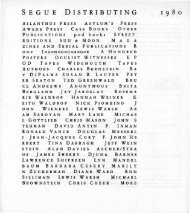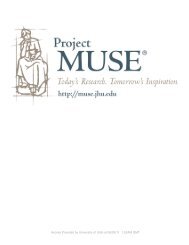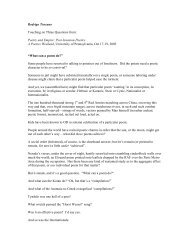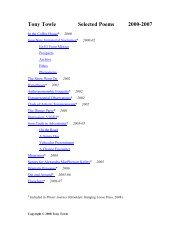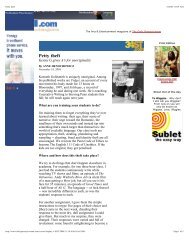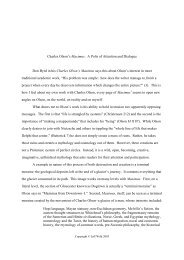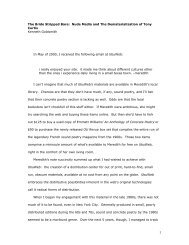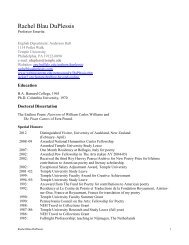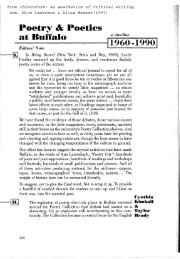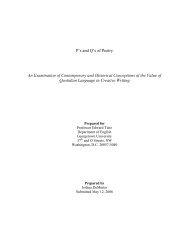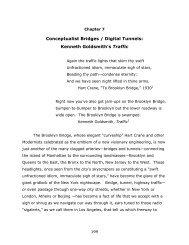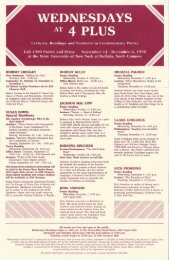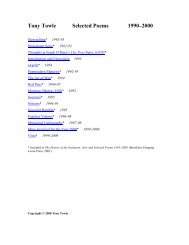- Page 1 and 2:
Preface Above the world-weary horiz
- Page 3 and 4:
of 750 subscribers. Because of the
- Page 5 and 6:
Introduction In a world where every
- Page 7 and 8:
But the "good old days" have passed
- Page 9 and 10:
Coeval with . . . to Ghosts vs. Mar
- Page 11 and 12:
From: Kevin Killian Subject: Carla
- Page 13 and 14:
If there’s one thing Harry learne
- Page 15 and 16:
The conservatism in this country co
- Page 17 and 18:
arts the mainstream is-and over the
- Page 19 and 20:
University of Auckland, is convenor
- Page 21 and 22:
less literate is implied by that "m
- Page 23 and 24:
What I am bothered about in these r
- Page 25 and 26:
From: Dodie Bellamy Subject: Breaki
- Page 27 and 28:
characterization of some the struct
- Page 29 and 30:
This is not so much ingratiation of
- Page 31 and 32:
My reconstruction of the argument i
- Page 33 and 34:
into the poetic. And I am wondering
- Page 35 and 36:
From: Patrick Phillips Subject: The
- Page 37 and 38:
ideology which contorts the referen
- Page 39 and 40:
disparaging Reznikoff-while preserv
- Page 41 and 42:
intervention). Though I can anticip
- Page 43 and 44:
eturns, repetitions, etc., is perme
- Page 45 and 46:
From: Benjamin Friedlander Subject:
- Page 47 and 48:
shrewd, often polemical presence of
- Page 49 and 50:
eadings, recognition. Being inside,
- Page 51 and 52:
If I resist the idea of a literary
- Page 53 and 54:
From: Susan Schultz Subject: Commun
- Page 55 and 56:
From: Patrick Phillips Subject: The
- Page 57 and 58:
From: Steve Evans Subject: the soci
- Page 59 and 60:
The tradition of the oppressed teac
- Page 61 and 62:
My wobble is social, not theoretica
- Page 63 and 64:
From: Dodie Bellamy Subject: Spicer
- Page 65 and 66:
From: Dodie Bellamy Subject: Re: Gh
- Page 67 and 68:
Hermit Crabs Don’t Cry to Politic
- Page 69 and 70:
From: Robert Creeley Subject: Chick
- Page 71 and 72:
From: Jed Rasula Subject: Re: Olson
- Page 73 and 74:
BED… (P.S. Just in Baltimore and
- Page 75 and 76:
From: Ron Silliman Subject: Motivat
- Page 77 and 78:
From: Steve Evans Subject: Motives
- Page 79 and 80:
past year or so, despite the fact t
- Page 81 and 82:
It seems clear to me that some of t
- Page 83 and 84:
To clarify one general point in clo
- Page 85 and 86:
the most "out there" manifesto we
- Page 87 and 88:
Actually, the question of age is a
- Page 89 and 90:
indulges in "increasingly modest fo
- Page 91 and 92:
From: Tony Green Subject: calling G
- Page 93 and 94:
From: Ron Silliman Subject: Flaming
- Page 95 and 96:
parataxis, collage, sonnets, whatev
- Page 97 and 98:
From: Larry Price Subject: Anachron
- Page 99 and 100:
From: Ron Silliman Subject: Exile o
- Page 101 and 102:
From: Paul Hoover Subject: politics
- Page 103 and 104:
From: Aldon L. Nielsen Subject: lat
- Page 105 and 106:
Every site glides away toward absen
- Page 107 and 108:
Certain aspects of desire were regi
- Page 109 and 110:
whatever chaotic way) offer the abi
- Page 111 and 112:
From: Susan Schultz Subject: notes
- Page 113 and 114:
mouth, thick with money and piety a
- Page 115 and 116:
From: Steve Evans Subject: Shake Th
- Page 117 and 118:
From: Susan Schultz Subject: haoles
- Page 119 and 120:
From: Ron Silliman Subject: Univers
- Page 121 and 122:
From: Steve Evans Subject: Universa
- Page 123 and 124:
From: James Sherry Subject: Re: Uni
- Page 125 and 126:
From: Wystan Curnow Subject: Re-Aca
- Page 127 and 128:
From: John Cayley Subject: Experime
- Page 129 and 130:
From: Marisa A Januzzi Subject: dis
- Page 131 and 132:
Two senses of disorder, as also man
- Page 133 and 134:
At its best, Language poetry never
- Page 135 and 136:
hymed couplets I’ll be a langpo w
- Page 137 and 138:
From: Leslie Scalapino Subject: Re:
- Page 139 and 140:
From: Tom Mandel Subject: Re: apex
- Page 141 and 142:
From: Marjorie Perloff Subject: Re:
- Page 143 and 144:
language fails to describe their ex
- Page 145 and 146:
From: Eric Pape Subject: Re: apex o
- Page 147 and 148:
All every night walk by the venue i
- Page 149 and 150:
From: Ira Lightman Subject: CALL FO
- Page 151 and 152:
From: Bob Perelman Subject: Governm
- Page 153 and 154:
independence and possible sense of
- Page 155 and 156: imagination, and often introduces t
- Page 157 and 158: From: Ron Silliman Subject: Boy Tal
- Page 159 and 160: From: B. Cass Clarke Subject: Quan
- Page 161 and 162: Look at it this way-email is one of
- Page 163 and 164: From: Nada Gordon Subject: where th
- Page 165 and 166: From: Cynthia Kimball Subject: Ghos
- Page 167 and 168: From: Loss Glazier Subject: Re: boy
- Page 169 and 170: I do not want to be a woman all the
- Page 171 and 172: i yam what i yam a world-changing f
- Page 173 and 174: SAME TIME TO EXPLORE THEORIES OF SE
- Page 175 and 176: From: Kali Tal Subject: Re: Boy Tal
- Page 177 and 178: From: Ann Louise Vickery Subject: D
- Page 179 and 180: From: Colleen Lookingbill Subject:
- Page 181 and 182: 7) Denial is an important part of t
- Page 183 and 184: equirement of having to "pay dues,"
- Page 185 and 186: From: Keith Tuma Subject: Re: Close
- Page 187 and 188: From: Maria Damon Subject: more on
- Page 189 and 190: From: David McAleavey Subject: Re:
- Page 191 and 192: From: Kenneth Sherwood Subject: Int
- Page 193 and 194: From: Hank Lazer Subject: close rea
- Page 195 and 196: d’appui). It is easier for studen
- Page 197 and 198: 7a. Most probably that the monolith
- Page 199 and 200: From: Eliot Katz Subject: more on c
- Page 201 and 202: emancipatory elements which a reade
- Page 203 and 204: From: Maria Damon Subject: Re: what
- Page 205: in the culture through coercion of
- Page 209 and 210: their experience in a potent form-t
- Page 211 and 212: From: Tom Mandel Subject: Re: Conse
- Page 213 and 214: From: Colleen Lookingbill Subject:
- Page 215 and 216: But her [Stein’s] account of firs
- Page 217 and 218: ecognized as "man." In the cane-wei
- Page 219 and 220: From: Alfred Corn (forwarded by Sus
- Page 221 and 222: From: Ron Silliman Subject: Value i
- Page 223 and 224: From: Alan Golding Subject: Howe No
- Page 225 and 226: so-called so-called Language writer
- Page 227 and 228: From: Keith Tuma Subject: Ghost Cor
- Page 229 and 230: ones that distinguish LP from "main
- Page 231 and 232: the "mainstream" poetry that has th
- Page 233 and 234: (politically indifferent, not worth
- Page 235 and 236: Lee Bartlett did with Palmer in the
- Page 237 and 238: seems to be a general consensus on
- Page 239 and 240: From: Alfred Corn Subject: More For
- Page 241 and 242: From: Marjorie Perloff Subject: Jor
- Page 243 and 244: From: Ron Silliman Subject: Childre
- Page 245 and 246: From: Kevin Killian Subject: A happ
- Page 247 and 248: From: Mark Wallace Subject: bland a
- Page 249 and 250: From: Mark McMorris Subject: Re: bl
- Page 251 and 252: what one could call a systematic sy
- Page 253 and 254: While I agree with Jeff Hansen’s
- Page 255 and 256: in this way as part of a guarantee
- Page 257 and 258:
The generational change has probabl
- Page 259 and 260:
of "elective affinity" by selective
- Page 261 and 262:
From: Jeff Hansen Subject: wild blu
- Page 263 and 264:
Hansen’s argument echoes (conscio
- Page 265 and 266:
not be so elegantly presented as it
- Page 267 and 268:
From: Jerry Rothenberg Subject: on
- Page 269 and 270:
I cannot make it cohere. I can read
- Page 271 and 272:
Before reading Pound, I had only re
- Page 273 and 274:
So why am I still conflicted about
- Page 275 and 276:
typos!) once a poem was in print. S
- Page 277 and 278:
Reproductions of Banality: Fascism,
- Page 279 and 280:
influence. This new Pound criticism
- Page 281 and 282:
Yet Pound’s poetry is never simpl
- Page 283 and 284:
From: Dick Higgins Subject: Web Poe



